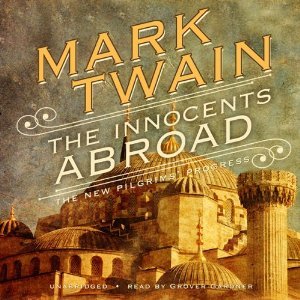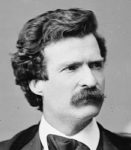 The Innocents Abroad: Or, The New Pilgrim’s Progress by Mark Twain
The Innocents Abroad: Or, The New Pilgrim’s Progress by Mark Twain Narrator: Grover Gardner
Published by Blackstone Audio, Inc. on September 9, 2011 (first published 1869)
Source: Purchased
Genres: Classic, Travel
Length: 18 hrs 13 mins
Format: Audiobook
Purchase at Bookshop.org or Purchase at Amazon
Add on Goodreads

In June 1867, Mark Twain set out for Europe and the Holy Land on the paddle steamer Quaker City. His enduring, no-nonsense guide for the first-time traveler also served as an antidote to the insufferably romantic travel books of the period.
“Who could read the programme for the excursion without longing to make one of the party?”
So Mark Twain acclaims his voyage from New York City to Europe and the Holy Land. His adventures produced The Innocents Abroad, a book so funny and provocative it made him an international star for the rest of his life. He was making his first responses to the Old World—to Paris, Milan, Florence, Venice, Pompeii, Constantinople, Sebastopol, Balaklava, Damascus, Jerusalem, Nazareth, and Bethlehem. For the first time he was seeing the great paintings and sculptures of the Old Masters. He responded with wonder and amazement but also with exasperation, irritation, and disbelief. Above all he displayed the great energy of his humor, more explosive for us now than for his beguiled contemporaries.
In 1866, Mark Twain was a travelling correspondent for the San Francisco Daily Alta California and he convince them in early 1967, to provide $1250 to pay his fare on the Quaker City tour of Europe and the Middle East. Throughout the five-month trip, Twain sent 51 letters to the Alta for which he was paid an addiationa $1200. The paper published between August 2, 1867 and January 8, 1868 under the running heading: “The Holy Land Excursion. Letter from ‘Mark Twain.’ Special Travelling Correspondent of the Alta.” These letters, together with seven printed in two New York papers, became the basis for Innocents Abroad, written during the first half of 1868.
First, you have to see the route this trip took. It looks like such an amazing trip and hits most of the spots I would love to see one day.

I don’t think I would want to visit with Twain though. While he is funny in a snarky way and full of historical tidbits, he’s not nice. Granted, he pokes fun of himself, his companions and the world equally. I feel like his negative attitude, which is great to read would be grating in real life. I enjoyed a lot of his observations and historical details and at times he can be sown right hilarious. The trip itself is amazing, from the Paris World’s Fair to the Parthenon to the Sea of Galilee. Some of the racism and lack of cultural appreciation is tough to overlook, though. Yes, I know it was written 150 years ago, but still.
I listened to the audio version narrated by Grover Gardner, who also narrates the Montalbano mysteries, which was a little odd at first. Montalbano is also a bit grumpy, sarcastic and anti-authority, so for the first chapter or so, it was kind of like Montalbano tours the world, but Twain is clearly an American, who says what he thinks, acceptable or not, but almost always amusing.
Twain, apparently, was a Presbyterian, and his comment on religious artifact, stories and sites are interesting. Some times he seems disillusioned and at other more amused by people’s ability to make money from “relics.” His other writing on religion might be interesting to read one day.
Overall, I’m glad I picked up The Innocents Abroad, but I wouldn’t call it a must read. It’s very based in its era, for good and bad.
And a couple quotes because who can resist quoting Mark Twain?
“In Paris they just simply opened their eyes and stared when we spoke to them in French! We never did succeed in making those idiots understand their own language.”
“All distances in the East are measured by hours, not miles. A good horse will walk three miles an hour over nearly any kind of a road; therefore, an hour, here, always stands for three miles. This method of computation is bothersome and annoying; and until one gets thoroughly accustomed to it, it carries no intelligence to his mind until he has stopped and translated the pagan hours into Christian miles, just as people do with the spoken words of a foreign language they are acquainted with, but not familiarly enough to catch the meaning in a moment. Distances traveled by human feet are also estimated by hours and minutes, though I do not know what the base of the calculation is. In Constantinople you ask, “How far is it to the Consulate?” and they answer, “About ten minutes.” “How far is it to the Lloyds’ Agency?” “Quarter of an hour.” “How far is it to the lower bridge?” “Four minutes.” I can not be positive about it, but I think that there, when a man orders a pair of pantaloons, he says he wants them a quarter of a minute in the legs and nine seconds around the waist.” (We measure distance here by time by time too. It’s 45 minutes Pittsburgh and 2 ½ hours to Oberlin, but I have no idea how many miles.)
“Broad, wholesome, charitable views of men and things can not be acquired by vegetating in one little corner of the earth all one’s lifetime.”

[…] The Innocents Abroad by Mark Twain review – 5/4/2018 […]
I know what you mean about a book being based in its era. I’m not sure this is for me.
I didn’t love it enough to say you should definitely read it. I didn’t hate it enough to say avoid it at all costs.
I’ve read very little of his works
I know I read Huckleberry Finn and Tom Sawyer, but it was years and years ago.
Still haven’t read Twain. I didn’t like the original Pilgrim’s Progress so this is probably not for me 🙂
The quotes you shared are so funny! I agree that it’s a view that is probably more fun to read than travel with though. And I’d also love to take a trip like that 🙂